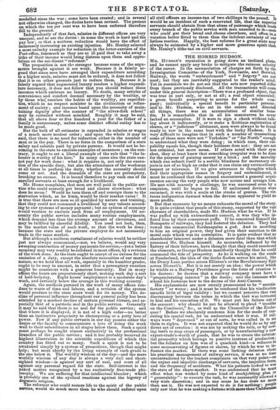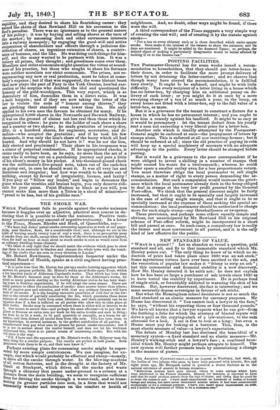THE HORRID HUDSON.
Mx. Hunson's reputation is going down an inclined plane, and he cannot apply any betake to mitigate the ruinous celerity of the career. In the accumulation of charges set forth by the Investigation Committee of the York, Newcastle, and Berwick Railway, the words "embezzlement" and " forgery" are not used; but they are inevitably suggested to the reader's mind. Yet in essentials we do not see that the acts now reported differ from those previously disclosed. All the transactions will come under this general description—There was a professed object, that was true in part only, or not at all; a real object concealed; a gross benefit purporting to accrue for the whole com- pany; individually a special benefit to particular persons; and to Mr. Hudson, who sat in the centre and directed all things, there was an accumulation of similar bene- fits. It is remarkable that in all his manoeuvres he never lacked an accomplice. If it were to sign a check without talk- ing about it indiscreetly, or to make a fictitious registration of shares, or a " judicious " allotment, men were always to be found ready to row in the same boat with the lucky Hudson. It is very difficult to imagine that in such a number of transactions some of these men were not "Yorkshire" or "far North" enough to understand what they were doing ; in which case, their cul- pability equals his, though their boldness does not : they are not less criminal, but more mean. If others acted with their eyes shut, they at least knew that something irregular was to be done for the purpose of gaining money by a trick ; and the morality which can submit itself to a servile blindness for mercenary ob- jects is not of so high an order that it can claim any extraordinary respect or tolerance. If we give utterance to thoughts which find their appropriate names in forgery and embezzlement, it must be confessed that the accused encountered a general acqui- escence among the very people who now accuse and arraign him. He met with scarcely a challenge, he was uncrossed even by a suspicion, until he began to fail. If unlicensed devices were surmised, it was with a smile at the stroke of genius. The vir- tuous indignation dawned when the devices appeared to yield no more profits. But that memento by no means exhausts the moral of the story. It is quite evident that people of this stamp, supported by the vast choruses of shareholders, made Mr. Hudson what he was. If he was puffed up with extraordinary conceit, it was they who in- flated him by their concurrent puffs. If be conceived himself the Bonaparte of railways, they had fostered the delusion. They had vowed the commercial Sardanapalus a god. And in ascribing to him an original power, they had given their sanction to the moral code which was its correlative. It is quite evident that no shareholder laboured under a delusion more fatal than that which possessed Mr. Hudson himself. As monarchs, inflamed by the flattery of their followers, have thought that they could command the elements, so George Hudson manifestly thought that he could command the tide of prosperity. As he is walking on the sands at Sunderland, the idea of the docks flashes across his mind, like the Drury Lane portico across Elliston's or the Revolutionary Epic across Disraeli's. But it is not merely an idea: the power which he wields as a Railway Providence gives the force of creation to his decrees : he decrees that a railway company must have a "preponderating interest" in the docks ; and the listeners who attend his footsteps bow to the decree of the Anti-Canute.
His explanations are now sternly pronounced to be " unsatis- factory" or worse ; and it must be confessed that his vindication smacks little of legal validity : but we cannot perceive that vast discrepancy between the terms in which the task was intrusted to him and his execution of it. We must put his failure out of the account : why should he not be allowed to plead " troubles on the Continent," &c., as well as the Chancellor of the Exche- quer? Before we absolutely condemn him for the mode of exe- cuting his special task, let us understand what it was. If rail- ways were " depressed" or out of sorts, he was called in to set them to rights. It was not expected that he would do so by any direct act of creation : it was not by making the rails, or by sow- ing teeth to reap crops of passengers, or by manufacturing a new export-trade's-worth of goods, that he was to create the substan- tial prosperity which belongs to positive increase of production; but the reliance on him was of a quackish kind—a reliance in some manuoavering of figures or shares, by which he was to in- fluence the market. If there was some lurking delusion about his practical management of railway service, it was at no time uncontradicted by the loudest complaints on that very point-011 the unjust and impolitic discharge of servants, the impolitic fares, and the frequency of accidents. What his patients looked to was the state of the share-market. It was understood that he must effect what was wished by some kind of stockjobbing plan or " generalship": to execute the task, he was necessarily allowed a very wide discretion; and in one sense he has done no more than use it. He was not expected to do it for nothing : people only saw that he was making a fortune with more than Californian
rapidity, and they desired to share his flourishing career: they seized the skirts of that Rowland Hill on his ascension to the fool's paradise. There was no ignorance as to the general nature of his policy : it was by buying and selling shares at the turn of the market ; by amassing dock and other extraneous interests into a railway monopoly; by engaging the good-will and active cooperation of shareholders and officers through a judicious dis- tribution of shares, an ingenious extension of shares, a contriv- ance of bonuses, and the like. He wasdoing such things for him- self, and the many wanted to be partners with him. It was a lottery all prizes, they thought ; and greediness came over them. Moralists and strict economists might question the virtue or sound- ness of his practice, but those who sought to share his fortunes were neither moralists nor strict economists. The prizes, not re- representing any new or real production, must be taken at some- body's expense ; but if that was suggested, the same blatant beast that now plays the part of Fury to the York Orestes, howled exe- cration at the sceptics who doubted the idol and questioned the honesty of the gold-worshipers. This very report, which is so damnatory of him, damnifies them in a direct ratio. It was a tacit bargain ; and if they are now taking the letter of the law to violate the code of " honour among thieves," they are pitching their standard even lower than his. He only applied to his own uses the favours he obtained for many. If he appropriated 8,000 shares in the Newcastle and Berwick Railway, it was on the ground of claims not less real than those which he recognized in others : he gave to the holder of each share a share and a quarter or two shares; he made gratuities of twenty-five, fifty, or a hundred shares, for engineers, secretaries, and di- rectors—who accepted the gratuities ; and if he took his few thousands, it was only the lion's share of the booty which all had hunted. And why should he not have it ? was he not the lion, duly elected and proclaimed ? Their share in his trespasses was a course of perpetual condonation. If he appropriated checks, it seems really to have been, as he says, no more than the act of a man who is setting out on a purchasing journey and puts a little of his client's money in his pocket. A ten-thousand-pound check was the millionaire's five-pound note, taken out of the cash-box on going out, in case he should want it. It was all very lax and licentious and irregular ; but how was wealth to be made out of nothing, except by favour of irregularity, licence, and laxity ? If you play at "follow my leader," and begin to denounce the game when the troubles and bruises begin, you only deserve ridi- cule for your pains. Paint Hudson as black as you will, you cannot make him more than a Triton in a shoal of minnows— "proud to be less, but of his godlike race."



























 Previous page
Previous page